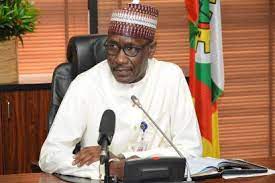Business
NNPC Redeploys Staff, Sacks COO

The Nigerian National Petroleum Corporation (NNPC), has announced the promotion and redeployment of some staff to fill vacant positions, as well as the disengagement of a Chief Operating Officer (COO) .
Group General Manager, Group Public Affairs Division, Kennie Obateru, announced in a statement issued in Abuja on Monday that Billy Okoye had been appointed the new Group Executive Director, Ventures and Business Development, while Aisha Ahmadu-Katagum was promoted to the position of Group Executive Director, Corporate Services.
“Until their new appointments, Mr Okoye and Mrs Ahmadu-Katagum were Group General Managers, Crude Oil Marketing Division and Supply Chain Management Division in the Corporation, respectively,” the statement read in part.
It added that former Chief Operating Officer, Business and Ventures Development, AdeyemiAdetunji, is now the Group Executive Director, Downstream; while former Chief Operating Officer, Corporate Services, Mohammed Ahmed, had now assumed the position of Group Executive Director, Gas and Power.
NNPC stated that other Chief Operating Officer positions in the Corporation had now been re-designated as Group Executive Directors, in alignment with the rules of Company and Allied Matters Act.
This, it said, was preparatory to the new status of the corporation as a limited liability company, post-Petroleum Industry Bill.
“The repositioning also saw the disengagement of former Chief Operating Officer, Gas and Power,” Yusuf Usman, the oil firm said.
It added, “The new appointments include that of Mr Garba-Deen Muhammad, who will take over from Dr Kennie Obateru, as the Group General Manager, Group Public Affairs Division of the corporation.”
The oil firm’s Group Managing Director, Mele Kyari, said the new appointments would enable the corporation to live up to the expectations of Nigerians.
He said the development would also enable the corporation to achieve its vision of becoming a world-class energy company of choice.
Transport
Automated Points Concession : FAAN Workers Gave 72hrs To Revise Decisions In PH

Transport
FAAN Announces Pick-Up Points for Go-Cashless Cards

Business
Fidelity Bank To Empower Women With Sustainable Entrepreneurship Skills, HAP2.0
-
Politics3 days ago
2027: NIGERIANS FAULT INEC ON DIGITAL MEMBERSHIP REGISTER DIRECTIVE
-

 Environment4 days ago
Environment4 days agoLAWMA Director Says Sweeping Reforms Have Improved Waste Collection
-
Politics3 days ago
LP Crisis: Ex-NWC Member Dumps Dumps Abure Faction
-

 Politics3 days ago
Politics3 days agoUmahi Dismisses Allegations On Social Media, Insists On Projects Delivery
-

 Sports4 days ago
Sports4 days agoAbia Not Sure To Secure continental Ticket
-
Politics3 days ago
NATASHA ELECTRIC VEHICLES INITIATIVE IN KOGI CENTRAL
-
Sports3 days ago
La Liga: Yamal Records First Career Hat-trick
-
Politics3 days ago
IT’S A LIE, G-5 GOVS DIDN’T WIN ELECTION FOR TINUBU – SOWUNMI

